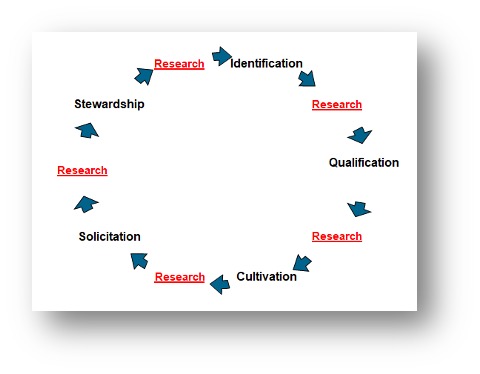- Home
- About Us
- The Team / Contact Us
- Books and Resources
- Privacy Policy
- Nonprofit Employer of Choice Award

Prospect research is hard, and it takes a long time! And, more often than not, research is done on a part-time basis by fundraising staff or someone on staff who is “assigned” to do research, but also has other duties such as database management and/or proposal writing (common areas of expertise that often go hand-in-hand with research).
In addition, prospect researchers are often stuck in a “reactive” mode of working – doing research on potential donors forwarded to them by the fundraising staff. Some fundraisers ask for a “FULL profile” on a prospect before any qualification of the prospect has even begun. This can take over eight hours to create, not counting the time it would take to input the information into the database (which we absolutely will)!
This “profile-dependent” world creates a real (or imaginary) backlog from the get-go when fundraisers feel they need a full profile to start the cultivation cycle. This can happen in small or large fundraising shops, (where often the researcher is separated from the fundraising team and doesn’t even know the context of the request) especially if the fundraising shop has been short a researcher or two.
The value of prospect research (and prospect researchers) is greater when it’s proactive (lead generation) and strategic (providing well-timed information to assist moving the prospect through the cultivation cycle) which also goes hand-in-hand with moves management.
Before we go any further, I will mention (maybe more than once) that “everything goes in the database!” or, the more popular saying “if it’s not in the database, it didn’t happen!” In other words, if you do any sort of work on a prospect, record it in the database so the information continues to be updated and dynamic, and not tucked away in a static profile (or god forbid, spreadsheet) somewhere (perhaps unknown to some users). With any luck, you will get to the point where you won’t have to do any profiles at all! That’s right, I said it. You can point fundraisers to the database record, and bam, there’s the info.
To make the best use of everyone’s time, researchers have set up staging processes which go hand in hand with the cultivation cycle.
 When working through the Cultivation Cycle ask yourself, “How much information does the fundraiser need to get to the next stage?” This will stop you from going down rabbit holes. You know it happens!
When working through the Cultivation Cycle ask yourself, “How much information does the fundraiser need to get to the next stage?” This will stop you from going down rabbit holes. You know it happens!
Identification
Ask Yourself: How much information does the fundraiser need to pick up the phone and call the prospect?
What research goes in the database:
Qualification
Ask Yourself: What will help the fundraiser start/continue the conversation?
What research goes in the database:
Cultivation
Ask Yourself: What motivates this prospect?
What goes in the database:
Solicitation
Ask Yourself: What program might this prospect want to support? What are they financially capable of giving? What have they done in the past to support your findings? E.g., naming opportunities.
What goes in the database:
Stewardship
Ask Yourself: How can we keep this donor engaged? What new opportunities might interest the donor? When would be an appropriate time to revisit the donor for an additional gift?
What goes in the database:
So research staging makes the most sense when working with the fundraising team on their donor journey. If all of the research is done at the Identification Stage, it could feasibly go stale over time (as full cultivation and solicitation takes a long time and prospects do move around and change their status) and/or the research may not be needed if a qualification meeting doesn’t take place and cultivation doesn’t even begin!
An interactive connection between the research and the fundraising teams makes the most sense for being efficient with everyone’s time, making sure all information is timely and relevant, and ideally allowing for the right ask, at the right amount, for the right program, at the right time.
Tracey Church has been a professional researcher for over 20 years and is the Past President of the Association of Professional Researchers in Advancement (APRA-Canada). She is the Principal, Researcher and Consultant with Tracey Church & Associates. Tracey is proud to be the Co-Editor and Co-Author of APRA-Canada’s first book “Prospect Research in Canada: An Essential Guide for Researchers and Fundraisers.” Tracey has worked with over 400 organizations in the fields of healthcare, education, social services, the arts, research, international, Indigenous, and the environment. She is a part-time faculty member at Western University (London, Ontario) teaching the Prospect Research in Fundraising course in the Master of Library and Information Science program (MLIS).